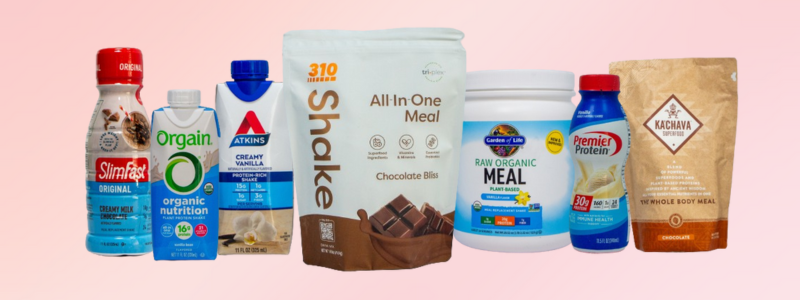We know you’ve been there (because we have to!). You’ve...
Many of us turn to meal replacement shakes for a quick and healthy meal in our busy lives. These shakes come in different types, but there’s a big question: should you choose ones with organic stuff or regular ones? This guide will discuss what’s in these shakes and help you decide what’s best for you. But first, let’s learn about organic vs. non-organic ingredients in meal replacement shakes.
Understanding Organic Ingredients in Meal Replacement Shakes
Organic food means keeping it natural. When something’s ‘organic,’ it’s grown and made without fake chemicals, altered ingredients, or artificial fertilizers. Instead, organic farming uses natural methods to grow crops and keep pests away. It’s good for us and the Earth.
To earn the ‘organic’ label, a product has to meet strict rules from groups like the United States Department of Agriculture (USDA). These rules make sure the food is made the right way. If you see the USDA organic label, it means at least 95% of the ingredients are natural. So, when you see ‘USDA organic,’ you choose a more natural and Earth-friendly option.
Benefits and Drawbacks of Organic Ingredients
Let’s discuss the good and not-so-good things about using organic ingredients in meal shakes.
Benefits of Organic Ingredients:
Fewer Fake Chemicals: Organic ingredients don’t have fake chemicals, so your food is less likely to have bad stuff.
Helps the Environment: Organic farming is kinder to the planet. It makes soil healthier and helps animals and water, too.
More Nutrients: Some studies say organic food has more good stuff like vitamins and minerals.
Drawbacks of Organic Ingredients:
Costs More: Organic stuff is pricier because it takes more work to grow it correctly.
Not Always Easy to Find: You might see organic stuff less often, depending on your area.
Non-Organic Ingredients in Meal Replacement Shakes

When it comes to meal replacement shakes, you’ll find that some include organic ingredients, while others use what we can call “regular” ingredients. These regular ingredients might contain synthetic chemicals and lab-made components.
The main difference is how they’re produced and sourced, with non-organic options often using less natural and less eco-friendly methods. So, when deciding on your meal replacement shake, it’s essential to understand the ingredients and where they come from.
Benefits and Drawbacks of Non-Organic Ingredients
Let’s discuss the benefits and drawbacks of using non-organic ingredients in meal shakes.
Benefits of Non-Organic Ingredients:
Cost-Effective: Non-organic ingredients are generally more affordable, making meal replacement shakes with these ingredients a budget-friendly option.
Wider Availability: You’ll find non-organic ingredients more readily available in various stores and regions, offering greater choices.
Drawbacks of Non-Organic Ingredients:
Synthetic Chemicals: Non-organic ingredients often contain synthetic chemicals, which can be detrimental to your health when consumed over time.
Nutrient Variability: The nutritional value of non-organic ingredients can vary based on farming practices, potentially leading to inconsistent nutrient levels in your meal replacement shakes.
Key Considerations in Nutritional Value of Meal Replacement Shakes
Now, look at how organic and non-organic ingredients compare regarding vitamins and stuff that’s good for you.
Nutrient Content in Organic vs. Non-Organic Ingredients
People wonder if organic stuff is better for you. Some studies say it might have more vitamins and other good things. But it depends on the farm and how things are grown. It’s important to remember that what’s inside the whole shake matters more than just if it’s organic or not.
| Aspect | Organic Ingredients | Non-Organic Ingredients |
| Vitamins and Minerals | Varied, potentially higher | Varied, may be lower |
| Pesticide Residue | Lower risk | Higher risk |
| Synthetic Additives and Preservatives | Fewer | More |
| Nutrient Variation by Farm | Can vary based on farming practices and soil health | Can vary based on farming practices and soil health |
| Overall Nutritional Value | Depends on the specific shake’s formulation and ingredients | Depends on the specific shake’s formulation and ingredients |
It’s important to note that the nutrient content can vary widely based on the specific ingredients used in each meal replacement shake and the overall formulation. Labeling labeled as organic or non-organic doesn’t guarantee a particular nutrient content. Therefore, it’s essential to look at the nutritional label and ingredient list for the specific shake you’re interested in to make an informed choice.
Impact on Overall Health
Choosing between organic and non-organic ingredients can affect your health differently. Here are some things to think about:
Less Fake Chemicals: Picking organic can mean fewer fake chemicals in your body, which is good for your health.
Special Diets: If you have food allergies or don’t want genetically changed food, organic might be a better choice.
Balance Matters: What’s most important is that your shake gives you everything your body needs, whether organic or not.
Environmental and Sustainability Factors
When considering environmental and sustainability factors in food production, it’s essential to recognize that the choices made in farming practices affect the environment directly and have broader implications for long-term ecological health.
Organic Farming Practices
Thinking about the environment is important, too. Organic farming takes care of the planet better. It uses things like natural fertilizers and healthy soil practices. Organic farms also avoid planting the same thing repeatedly, which is better for the soil and bugs.
Non-Organic Farming Practices
Regular farming can sometimes use fake chemicals and things that might hurt the environment in the long run.
Environmental Impact
The way food is made affects the environment. Choosing organic can help the environment because it’s made in a way that’s kinder to the planet. But remember, how food is transported and packaged also matters for the environment.
Taste and Texture

Regarding the taste of organic food, it depends on your liking. Some folks might say organic food tastes better, but it’s like choosing between chocolate and vanilla ice cream – it varies from person to person.
As for how the food feels in your mouth, there might be slight differences between organic and non-organic ingredients, but these differences usually don’t greatly impact how your meal replacement shake tastes or feels when you drink it. So, when deciding between organic and non-organic, it’s smart to consider other factors like health benefits and your values instead of just considering the taste and texture.
Cost Analysis
Price Comparison: Organic vs. Non-Organic Ingredients in Meal Replacement Shakes:
| Aspect | Organic Meal Replacement Shakes | Non-Organic Meal Replacement Shakes |
| Average Price per Serving (USD) | $3.50 – $5.00 | $2.00 – $3.50 |
| Cost for One Week (2 Shakes/Day) | $49.00 – $70.00 | $28.00 – $49.00 |
| Cost for One Month (2 Shakes/Day) | $196.00 – $280.00 | $112.00 – $196.00 |
| Cost for One Year (2 Shakes/Day) | $2,352.00 – $3,360.00 | $1,344.00 – $2,352.00 |
Please note that these prices are approximate and can vary based on brand, location, and specific product features. Additionally, organic meal replacement shakes are generally more expensive due to the higher costs associated with organic farming and certification.
Factors Influencing Consumer Decisions
Your choice between organic vs. non-organic ingredients in meal replacement shakes depends on what you care about. Here are some things that can help you decide:
Your Health: If you’re worried about chemicals in your food, you might pick organic.
Love for the Earth: If you care about the planet, go for organic because it’s kinder to the environment.
Budget: If you want to spend less, non-organic options might be better for your wallet.
Taste Matters: Some people just like the taste of organic better, while others don’t notice a big difference.
Special Nutritional Needs: Your choice might depend on whether you need certain nutrients or don’t want genetically changed food.
Aligning Meal Replacement Choices with Values
Ultimately, your choice between organic and non-organic ingredients should match what you believe in and can afford. Here are some things to help you decide:
Think About What Matters: Consider what’s most important to you: health, the environment, taste, or cost.
Read the Labels: Look at the ingredient list and what it says on the packaging to understand where it comes from and if it’s certified organic.
Check the Brand: Some companies care a lot about being eco-friendly and honest about what’s in their shakes.
Try Different Shakes: The taste is personal, so you should try a few different shakes to find the perfect one.
Why Choose Organic Meal Replacement Shakes Over Non-Organic?
Opting for organic meal replacement shakes can bring several benefits, making them a preferred choice for those prioritizing health and environmental concerns. Here are some compelling reasons to choose organic over non-organic meal replacement shakes:
Fewer Bad Chemicals: Organic shakes have fewer harmful chemicals, which means they’re better for your health.
Good for the Environment: Organic farming is kinder to the Earth, using natural methods and avoiding harmful pesticides and fertilizers.
More Nutrients: Some studies suggest that organic food may have more vitamins and minerals, which can benefit your overall health.
Allergies and GMOs: Opting for organic shakes is a more secure choice for individuals with food allergies or those seeking to steer clear of genetically modified ingredients.
Supporting Sustainable Farming: Choosing organic supports farms that care about the environment, use natural pest control, and promote biodiversity.
In summary, organic meal replacement shakes offer advantages regarding reduced exposure to harmful chemicals, better environmental practices, potential nutrient benefits, and allergen/GMO considerations. If you value your health, the well-being of the planet, and the quality of your food, organic options may align better with your values and priorities.
FAQs
Are Organic Meal Replacement Shakes Healthier Than Non-Organic Ones?
Organic shakes might be healthier because they usually have fewer chemicals, but most importantly, they give you all the necessary nutrients.
Are Organic Meal Replacement Shakes Worth the Higher Cost?
It depends on what you care about. They might be worth it if you want to support organic farming and are okay with spending more. But non-organic shakes can be good for your health, too.
Do Organic Meal Replacement Shakes Taste Better?
Taste is different for everyone. Some people like the taste of organic stuff, but this is only true for some.
What Are the Environmental Benefits of Choosing Organic Ingredients?
Picking organic ingredients helps the environment because it’s made in a way that’s better for the planet. It’s a choice that supports healthy soil and less harm to nature.
Final Thoughts
As we explore organic vs. non-organic ingredients in meal replacement shakes, remember there’s no one-size-fits-all answer to this question. Your decision should be based on your value, health needs, and budget. Whether you choose organic or regular ingredients, what matters most is that your shake provides the nutrition your body needs and fits your lifestyle. So, go ahead and make your choice with confidence, knowing that it aligns with your personal values and health goals.
[wptb id=5842]RV Team
Related Articles
Best Meal Replacement Shakes for Weight
Meal replacement shakes for weight loss are specially formulated nutritional...
How to Use Meal Replacement Shakes
Meal replacement shakes are basically those handy-dandy drinks that come...
Can Meal Replacement Shakes Help You
Can Meal Replacement Shakes Help You Lose Weight? Meal replacement...
* Reviewology is in partnership or collaborates with top brands highlighted on this site, including those occupying the top ranking positions.
Additionally, we earn affiliate commissions from products showcased on this website when you make a purchase through the provided links on Amazon or the company website directly.
We appreciate your support using our links to purchase your favorite brands or newly discovered brands.
Latest updates
I Thought I’d Always Feel Tired, Fat, and Forgotten—Until This
310 Greens vs AG1
The Truth About 310 Greens: A No-Nonsense Review of This Popular Supplement
Popular
I Thought I’d Always Feel Tired, Fat, and Forgotten—Until This
310 Greens vs AG1
The Truth About 310 Greens: A No-Nonsense Review of This Popular Supplement
© 2024 Reviewology. All Rights Reserved.




